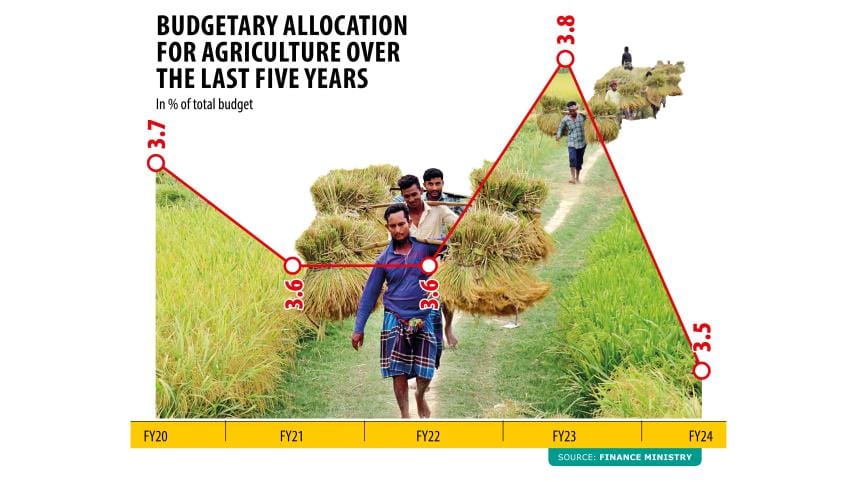Agriculture should get top priority in budget: economists

Agriculture should be given the highest priority in the upcoming national budget as food security has to be ensured for the people of Bangladesh, economists said yesterday.
The land available for agricultural purposes is decreasing by 0.5 percent every year while the population is increasing day by day, they said.
There are also challenges stemming from climate change and geopolitics. Therefore, it is necessary to increase food production locally, they added.
They made the comments at a seminar on the political economy of agrarian futures in Bangladesh, organised by the Bangladesh Institute of Development Studies (BIDS) on its premises in the capital.
About 40 percent of the population is now dependent on agriculture for jobs and that is why the government should not divert its attention from this sector at this time of austerity, said Binayak Sen, director general of BIDS.
"In the current situation, it is very important to rationalise tariffs and subsidy policies for agricultural products. Because these are our home-grown products," he said.
Arrangements should be made so that the agricultural technologies that have been developed can reach grassroots farmers, he said, adding: "If we can do that, the country will move further forward."
For fiscal year 2023-2024, the government allocated only 3.5 percent of the total budget to the agriculture sector according to finance ministry documents.
MA Sattar Mandal, former vice-chancellor of the Bangladesh Agricultural University, said: "We have some direct results of the transformation that is taking place in the agricultural sector of Bangladesh."
"Our production has increased. Food security has improved. Although the producers incurred losses in some aspects, their overall income increased. There is diversity in agriculture," he said.
Farmers are cultivating not just grains, but also flowers, fish and fruits alongside cattle, he added.
"There are also challenges. The amount of land available for cultivation is decreasing," he said, adding that efforts were being made to bring lands in hilly and coastal areas under cultivation, albeit on a limited scale.
Mandal added that the progress in production must continue and the big challenge now is finding ways to do so.
Since the population is increasing, the yield will have to be doubled. And the only way to do this is to increase the use of modern technology, he said.
Muhammad Abdur Razzaque, chairman of the parliamentary standing committee of the agriculture ministry, said there is a good possibility of cultivating a diverse range of crops commercially to tackle the food shortage.
"Bangladesh is still a food deficient country. There is a lot of land left unused for long periods of the year due to salinity and irrigation problems. In this case, there is a good possibility of cultivating a diverse range of crops commercially," he said.
In many cases, such crops can be produced without hampering rice cultivation. Through this, food security will be attained and export earnings will also increase, added Razzaque, a former agriculture minister.
Atiur Rahman, professor emeritus of the Department of Development Studies at the University of Dhaka, said agricultural land is falling prey to urbanisation, which is having a major impact on crop production.
He said noticeable efforts are being made to attract investment in economic zones, but the effort to attract investment in agriculture is less visible, he said.
Hossain Zillur Rahman, executive chairman of the Power and Participation Research Centre, said agriculture may be the most important factor when it comes to earning foreign currency after garments and remittances. So, it needs to be prioritised in policy, he said.
Professor MM Akash, faculty of BIDS Graduate School of Economics, said small farmers should be given guarantees of just prices for their harvests, provided credit on easy terms, and adopt efficient technology to increase agricultural production.
Geof Wood, professor emeritus of international development at the University of Bath, also spoke at the event.



 For all latest news, follow The Daily Star's Google News channel.
For all latest news, follow The Daily Star's Google News channel.
Comments